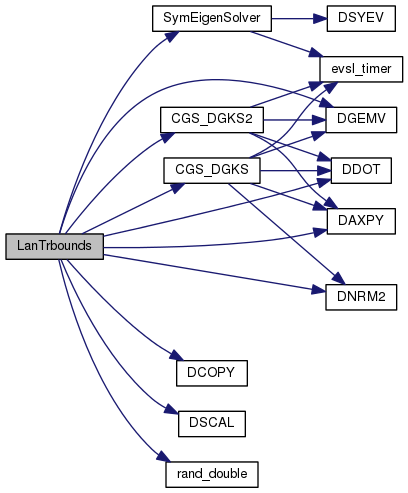 |
EVSL
1.1.0
EigenValues Slicing Library
|
 |
EVSL
1.1.0
EigenValues Slicing Library
|
A more robust algorithm to give bounds of spectrum based on TR Lanczos. More...
#include <stdlib.h>#include <stdio.h>#include <math.h>#include <string.h>#include <float.h>#include "def.h"#include "blaslapack.h"#include "struct.h"#include "internal_proto.h"Go to the source code of this file.
Macros | |
| #define | COMP_RES 0 |
Functions | |
| int | LanTrbounds (int lanm, int maxit, double tol, double *vinit, int bndtype, double *lammin, double *lammax, FILE *fstats) |
| Lanczos process for eigenvalue bounds [Thick restart version]. More... | |
A more robust algorithm to give bounds of spectrum based on TR Lanczos.
Definition in file lanTrbounds.c.
| #define COMP_RES 0 |
Definition at line 11 of file lanTrbounds.c.
| int LanTrbounds | ( | int | lanm, |
| int | maxit, | ||
| double | tol, | ||
| double * | vinit, | ||
| int | bndtype, | ||
| double * | lammin, | ||
| double * | lammax, | ||
| FILE * | fstats | ||
| ) |
Lanczos process for eigenvalue bounds [Thick restart version].
| [in] | lanm | Dimension of Krylov subspace [restart dimension] |
| [in] | maxit | max Num of outer Lanczos iterations (restarts) allowed – Each restart may or use the full lanm lanczos steps or fewer. |
| [in] | tol | tolerance for convergence |
| [in] | vinit | initial vector for Lanczos – [optional] |
| [in] | bndtype | Type of bound >1 for kato-temple, otherwise simple |
| [out] | lammin | Lower bound of the spectrum |
| [out] | lammax | Upper bound of the spectrum |
| [out] | fstats | File stream which stats are printed to |
Definition at line 38 of file lanTrbounds.c.
References Calloc, CGS_DGKS(), CGS_DGKS2(), DAXPY(), DCOPY(), DDOT(), DGEMV(), DNRM2(), DSCAL(), evsldata, _evsldata::ifGenEv, Malloc, min, _evsldata::n, NGS_MAX, orthTol, rand_double(), and SymEigenSolver().
Referenced by evsl_lanbounds(), and main().


 1.8.6
1.8.6